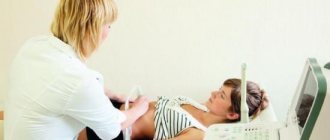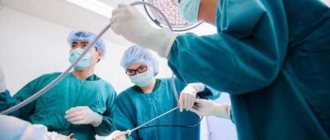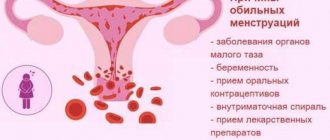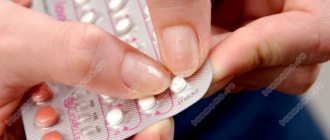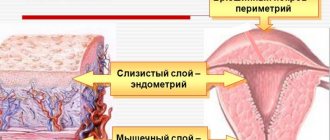Why is the functioning of the ovaries disrupted?
Causes of ovarian dysfunction:
- Diseases of the internal genital organs (inflammation, tumors, injuries, congenital pathology).
- Diseases of the endocrine system (diabetes mellitus, obesity, thyroid disease).
- Diseases of the nervous system, including stress and fatigue.
- Side effects of medications.
- Abortions, miscarriages, complications after previous births.
- Malnutrition, lack of vitamins.
If all these causes are identified and eliminated or excluded, it is possible to stimulate the ovaries with medications or folk remedies.
Age of early menopause
By “early menopause,” gynecologists mean a condition in a woman’s body in which menstrual changes cease earlier than expected. During the year, menstruation may be absent for several cycles in a row, after which it disappears completely. Early menopause develops. This disorder is said to occur when the absence of menstrual flow is noted before a woman turns 40 years old.
Normally, the menopausal age of women is between 46-54 years. When menstruation loses its regularity, becomes less abundant, and several cycles are missing, menopause is said to have occurred. If this condition develops between 35-40 years, the diagnosis is early menopause. The pathology is rare - in 1 in 100 middle-aged women.
Perimenopause and menstruation
Since the first stage of menopause is characterized by a constant change in the menstrual cycle, many women try to restore their periods on their own in order to prolong normal life. It is during premenopause that the first changes in the menstrual cycle occur, as well as the symptoms that every woman experiences. The course of menstruation at the first stage of menopause in premenopause is characterized by the following features:
- the time interval between the onset of menstruation increases or decreases;
- it is difficult to predict when menstruation will occur, because at the first stage of menopause, a number of changes are triggered that do not allow menstruation to correspond to the calendar;
- the duration of the cycle increases or decreases, the same can be said about the duration of the discharge;
- the amount of blood released during menstruation also changes, it becomes less;
- the nature of the discharge changes: it becomes viscous and smeared;
- blood during menstruation may come out with clots and also have an unpleasant odor at the end;
- Acute pain occurs in the lower abdomen before the onset of menstruation.
In addition to the problems listed above, there are other violations. The regularity of the cycle is affected by the thyroid gland, the functioning of which may also be disrupted due to perimenopause. A woman can gain weight, which is why many ladies want to delay the approach of menopause and restore the cycle.
Diet
Proper nutrition will help normalize a woman’s cycle and reproductive function. If a woman’s body is depleted, its natural need is to restore the supply of nutrients, and not to reproduce. The diet must contain the required amount of nutrients, vitamins and minerals.
You can take a multivitamin complex to compensate for the deficiency of these components in the body. Vitamin E has the greatest benefit: it normalizes the cycle and restores reproductive function.
How to restore normal ovarian function with food? It is healthy to eat olive oil, walnuts and hazelnuts, and sunflower seeds. Legumes, soybeans, dates, sesame seeds, pumpkin seeds, wheat germ, honey and propolis stimulate ovulation.
It is recommended to include tomatoes, apples, and pomegranates in your diet. Animal products also improve ovarian function - meat and fish, eggs, milk, sour cream and cottage cheese. It is necessary to exclude strong tea and coffee, alcohol from the menu, and limit chocolate. Cabbage and rice dishes also suppress ovulation.
Basic methods for restoring menstruation
It makes sense to restore menstruation only if there is a chance to preserve the woman’s reproductive function, so to resolve this issue you need to go to the doctor. We will look at the most popular methods of getting your period back. Among them: drug therapy and traditional medicine methods. But the best remedy is the prevention of menopause in women, which is carried out long before its onset. If menstruation still disappears, doctors resort to quite effective methods: various types of massage, hormonal treatment and herbal medicine, lifestyle adjustments.
Causes of early menopause
The causes of early menopause may vary. Because of this, diagnostic measures take a long time. Doctors often determine that the disorder is caused by several reasons. Among the main provoking factors it is customary to highlight:
- Autoimmune disorders - occur in diseases such as diabetes, hypothyroidism, thyroiditis, Addison's disease (adrenal cortex insufficiency).
- The results of chemotherapy and radio wave irradiation result in the treatment of tumor processes. The early onset of menopause can also be caused by exposure to potent drugs (chemotherapy) that inhibit the functioning of the ovaries.
- Bad habits – smoking negatively affects the functioning of the gonads. Studies have shown: 15% of women with early menopause are heavy smokers.
- Stressful situations - during overexertion and anxiety, adrenaline is synthesized in large quantities, which inhibits the production of sex hormones in women.
- Heredity - early, premature menopause is provoked by a defect in the sex X chromosome, transmitted through the female line.
- Surgical intervention on the reproductive organs, removal of the ovaries - menstrual function is completely disrupted, artificial menopause occurs.
How to prevent early menopause?
Changes in the functioning of the reproductive system that occur during menopause worsen a woman’s overall well-being, completely changing her usual way of life. The signs of early menopause in practice do not differ from those that appear during a timely menopause. They are characterized by dysfunction of the cardiovascular, nervous and endocrine systems.
With the onset of menopause, the gonads begin to produce hormones in less volume. As a result, the concentration of estrogen in the blood decreases sharply. This phenomenon directly provokes the development of the corresponding symptoms:
- Failure of the rhythm of menstrual flow - periods become scanty. may be absent for a long time, turning into a daub.
- Tides. increased sweating - a woman notices sudden bouts of heat during the day, her face becomes red.
- Sleep disturbance – due to changes in hormonal levels, rest patterns are disrupted (insomnia).
- Vaginal dryness – daily discharge decreases in volume, the woman feels discomfort, sexual intercourse becomes painful.
- Disturbance in the process of urination - often an increase in the processes of urine separation is recorded.
The consequences of early menopause include changes in menstrual function. This violation is accompanied by the following phenomena:
- lengthening or shortening the cycle duration;
- loss of several menstrual cycles in a row - menstruation may be absent for several months.
Such changes have a negative impact on women's health. Among the consequences of menopause occurring earlier than the established time frame:
- destructive changes in the gonads, inflammatory processes - oophoritis, adnexitis, cervicitis;
- uterine bleeding;
- reproductive dysfunction.
Treatment of early menopause in women is carried out individually. A lengthy, comprehensive examination precedes the start of the therapeutic process. It directly determines the cause of menopausal changes. The course of treatment for this disorder includes:
- taking hormonal medications;
- diet adjustments;
- performing physical exercises.
Early menopause, the treatment of which is selected exclusively by a doctor, can only be eliminated through hormonal therapy. The basis of such drugs is estrogens. Directly, the lack of these biological compounds provokes symptoms of early menopause in women. In addition, the drugs used in treatment also contain a second sex hormone - progesterone.
Hormone replacement therapy (HRT) is mandatory if the following symptoms are present:
- hot flashes;
- change of mood;
- urinary disorders;
- cessation of menstrual flow before the age of 40.
Hormones during early menopause reduce their concentration in the blood. Because of this, there is a need to take them together with medications. The course of treatment is determined by doctors. In this case, the medicine, its dosage, frequency of administration and duration of use are indicated. HRT has such positive effects on a woman’s body as:
- normalization of blood pressure;
- stopping atherosclerotic changes;
- prevention of bone changes;
- improving skin elasticity;
- reduction of menopausal symptoms.
1. Regular physical activity – physical exercise has a positive effect on the body’s condition. Pilates, gymnastics, and yoga are suitable for sports.
2. Proper nutrition. Nutritionists advise women with a predisposition to gynecological diseases to reduce the calorie content of their meals. At the same time, the intake of meat, salt, and alcohol into the body is limited. Reduce portion sizes by increasing meal frequency. The diet should contain:
- fish;
- seafood;
- lots of vegetables and fruits;
- dairy products.
3. Maintain personal hygiene. Correct and regular toileting of the external genitalia plays an important role.
Every woman at a certain period of her life is faced with the phenomenon of menopause. This is the period when a woman's reproductive state changes to non-reproductive. Sexual functions decrease over time, eggs do not mature and menstruation stops. Menopause usually begins in women after 40 years of age and lasts for more than one year.
However, it can take place in a very difficult form, which causes discomfort to the woman, and often requires the help of a doctor. The article discusses the main symptoms and signs of the onset of menopause, the causes and symptoms of early menopause at the age of 42, and the symptoms of an even earlier menopause at the age of 40, and why menopause occurs in young women.
Sometimes the menopause period lasts about several years. Its duration can be 2-10 years. Some people experience this period easily, while other women experience constant pain and poor health. But this is affected by abortions, sexually transmitted diseases, and operations. The more abortions a woman has had, the more likely it is that early menopause will occur in a painful form. In women who have had their ovaries removed during surgery, menopause may occur earlier than at 42 years of age.
1 Menstruation is heavy and prolonged;
2 Menstruation comes late, becomes irregular or does not occur at all;
3 Sleep disturbance, possible insomnia;
4 Hot flashes appear, during which redness of the face and sweating occur;
5 Emotional background changes, mood swings, depression;
6 Frequent urination or complete incontinence;
7 Feelings of anxiety and restlessness.
At the very beginning of menopause, a woman’s health and general well-being deteriorate sharply. This phenomenon is especially unpleasant for women over 42 years of age. The onset of menopause is a sign that reproductive function is coming to an end. The absence of menstruation indicates a decrease in the functioning of the genital organs.
1 Avoid stress;
2 Give up alcohol or reduce consumption to a minimum;
3 Drink less black coffee or avoid it altogether;
4 Eliminate fatty and spicy foods from the diet;
5 Take a shower before bed;
6 Exercise;
7 Drink herbal teas, various herbal infusions;
8 Avoid saunas, solariums, hot baths, tanning;
9 As soon as the tide comes in, breathe deeply and squat several times.
The onset of menopause at the age of 42 years, due to a decrease in calcium and collagen in the body, is also accompanied by a decrease in bone density. As a result, this can lead to various fractures or the development of osteoporosis. To prevent this, you need to take calcium, magnesium, phosphorus and, of course, vitamin D.
Also, with the appearance of signs of menopause in a woman’s body, the level of estrogen decreases, which affects the development of cardiovascular diseases. In this regard, it is advisable to start leading a healthy lifestyle. Avoid stress, eat right, watch your cholesterol, move more, eliminate excess weight.
Estrogen deficiency negatively affects the condition of the mucous membrane of the urethra and vagina, the mucous membrane becomes easily wounded and dry. As a result, itching and dryness of the vagina give a woman quite an unpleasant sensation and can cause discomfort during sexual intercourse. Urinary incontinence may also occur.
During this period, many women's hair becomes brittle and turns grey. Hair may begin to grow on your thighs, neck, and even your face. This occurs due to the imbalance of androgens and estrogens. The skin becomes less elastic and firm, wrinkles appear due to a decrease in the production of the required amount of collagen.
If you no longer have menstruation at age 42 or if they are irregular, this can lead to weakening of the pelvic muscles, as well as spraining of the ligaments that support the internal organs. A decrease in the level of sex hormones can lead to prolapse of the posterior vaginal wall, as well as prolapse of the uterus. Uterine prolapse is accompanied by pain and urinary incontinence.
During menopause, weight gain also occurs. To control your weight, it is better to use the body mass index. For women during menopause, an index of less than or equal to 25 is considered ideal. If such signs appear at the age of 42, they should under no circumstances be ignored. It is imperative to consult a doctor who will recommend certain exercises aimed at treatment during this period.
It is considered normal for a woman if the primary symptoms of menopause occur at the age of about 50 years. In fact, most modern women experience these symptoms between the ages of 38 and 45. This is primarily due to the annual gradual deterioration of living conditions of the population, such as ecology, sedentary lifestyle and other consequences of the technological breakthrough of recent years.
In the case when the decline of a woman’s reproductive function begins after the age of 50, then such a course of menopause is considered normal, given that the intensity of symptoms at this age is minimal and most comfortable. If menopause occurs between the ages of 35 and 50, then it is already considered early and requires much more attention from medical institutions.
It should be noted that the development of early menopause is more difficult and problematic for women from the point of view of psychological and physical condition. Today, there is no clear answer regarding the causes of early menopause, therefore, in each individual case, when visiting a doctor, an individual plan is drawn up to relieve or partially extinguish the intensity of symptoms.
What happens to the ovaries during menopause?
The period of menopause is a significant stage in the life of any representative of the fairer sex. At this time, a complex of global changes occurs, which often cause a lot of anxiety and discomfort.
These changes affect all areas of the female body, but especially pronounced changes occur in the woman’s reproductive organs, in particular in the ovaries.
After all, it is here that processes take place aimed at achieving the main goal of menopausal changes - the completion of reproductive function. What happens to the ovaries during menopause? Let's figure it out.
Symptoms of polycystic ovary syndrome
Such enlarged follicles are otherwise called “cysts”. If the appearance of a persistent follicle is not isolated, then doctors talk about the development of a disease such as polycystic ovary syndrome. This disease can be expressed by the following symptoms:
- long delay of menstruation. The cycle increases to 35 days or more. Although during menopause this symptom is not fundamental, because the irregularity of the cycle at this time is a completely natural phenomenon;
- abundant or, conversely, scanty menstrual flow, which accompanies feelings of severe pain. However, the nature of the discharge during menopause is also a controversial sign, because this stage itself causes a similar picture;
- pain can manifest itself, localized in the area of the left or right ovary, depending on the location of the cysts. Unpleasant sensations persist beyond menstruation. Sexual intercourse becomes painful;
- enlargement of the ovaries, which is easily explained by the presence of persistent follicles in their cavity. In this case, the size of the uterus becomes below the physiological norm;
- increase in body weight with a characteristic distribution of body fat according to the male type;
- excessive growth of body hair;
- complete or partial hair loss;
- increased activity of the sebaceous glands;
- acne;
- deepening of the voice.
Why is it dangerous?
Polycystic disease is dangerous, first of all, due to malignant degeneration. It is during menopause that this probability increases several times. In addition, it can provoke a number of pathological processes in the body: mastopathy during menopause, myocardial infarction, diabetes, hypertension, stroke, obesity, vascular thrombosis.
Treatment
Treatment of polycystic ovary syndrome and single cysts can be either medicinal or surgical. Initially, preference is given to hormonal therapy; during menopause, it usually has a pronounced positive effect on the course of the disease. If there is no positive dynamics, then polycystic disease has to be treated with the help of a surgeon.
It should be remembered that the appearance of any pain in the pelvic organs should be a reason to immediately consult a doctor.
How to stimulate the ovaries during menopause
The longer a woman’s ovaries maintain their full functioning, the later irreversible age-related changes will begin in the body. How to make the ovaries work more actively?
The foundation of any positive transformation should be a change in lifestyle. This concept includes a whole range of activities.
Proper nutrition
Nutrition is of great importance. Preference should be given to foods of plant origin (vegetables, fruits, berries, herbs, cereals), fermented milk products, dietary meats and fish. It is important to reduce the amount of animal fats consumed and give up fried, smoked, and overly salty foods.
It is equally important to drink enough drinking water. To function properly, the human body requires about 1.5 liters of clean water per day.
In order to support the functioning of not only the reproductive organs, but also the entire body as a whole, during menopause, you can supplement your diet with vitamin and mineral complexes. The modern pharmaceutical market offers a huge selection of drugs of this kind. Their composition is designed taking into account the changes characteristic of menopause. For example, these could be:
Active lifestyle
Equally important is regular physical activity. It helps to avoid the occurrence of congestion in the pelvic organs, thereby preventing the development of pathological processes, helps reduce pain during menstruation, and helps the woman’s reproductive system work in a balanced manner.
Use of infusions and decoctions
The safest option for influencing the functioning of the ovaries may be the use of infusions and decoctions of medicinal plants rich in plant estrogens. Phytocompositions based on these plants can perfectly complement the main treatment of menopausal changes in the ovaries :
- sage;
- hog uterus;
- red brush;
- red clover;
- shepherd's purse.
Taking phytohormones
An improved option may be the treatment of ovarian dysfunction with drugs based on plant estrogens.
These funds help achieve a milder course of menopausal changes, as well as prevent the development of pathologies, including those of the ovaries.
Their choice today is huge, each individual drug has its own characteristics and effect on the female body. Therefore, treatment should be entrusted to an experienced specialist. The most popular and effective means are:
- Klimadinon;
- Klimanorm;
- Qi-Clim;
- Mense;
- Menopace capsules;
- Estrovel.
Phytotherapy
Some plants have the ability to influence the functioning of the ovaries, as they contain natural hormones - phytoestrogens.
- Sage stimulates the production of hormones by the ovaries. A decoction is prepared from it, which is taken orally, three tablespoons 3 times a day for one week. The course can be repeated in a month. Sage is often brewed together with linden. These herbs are added 1 tbsp. by 1.5 tbsp. water. The composition must be boiled and drunk chilled, 1 tbsp. three times a day. Therapy begins on the 4th day after the onset of menstruation and continues for one week. After 2 courses of monthly therapy, a break in treatment is taken for 1 month.
- Rose petals are poured with boiling water and infused in a sealed container, the decoction is taken one teaspoon at a time. before bed one week. The course is repeated after a month.
- Aloe is known not only for its antimicrobial properties, but also as a remedy that will help restore ovarian function. To make a medicinal preparation, cut leaves are placed in the refrigerator for 5 days, peeled, finely chopped and mixed with honey and butter and pork oil in equal proportions. Drink this medicine twice a day, one tablespoon.
- If the ovaries are not working, you can use parsley infusion. For 4 tbsp. leaves of grass are poured into a glass of hot water. After 12 hours, you can drink the infusion half a cup three times a day before meals for 2-3 weeks. Then they take a break for a week.
- For infertility, medicinal knotweed is used. 4 tablespoons of knotweed are poured into 500 ml of hot water. It is enough to infuse the decoction for 4 hours. Take the medicine ½ cup three times a day before meals. In addition to restoring ovarian function, knotweed helps in the treatment of other gynecological diseases.
- Plantain is used as a decoction. Take half a glass of water per teaspoon and bring to a boil. After cooling, take 2 tablespoons of the decoction. three times a day.
- The hog uterus will help restore ovarian function. Often, for reproductive disorders, this herb is used together with sage. In the first two weeks of the cycle, I take ¼ cup of sage decoction 4 times a day. After 2 weeks, a decoction of boron uterus is prescribed according to the same scheme. Herbal decoctions are prepared in the proportion of 1 tbsp. plants 1 glass of water.
- A red brush can improve ovarian function. This herb can be used alone or together with hogweed. The root of the plant has medicinal properties. 1 tbsp. Place the herbs in a small saucepan, pour 250 ml of boiling water and boil for 5 minutes. You can take the medicine after an hour. Drink ½ cup of decoction 30 minutes before meals for a month. For greater effectiveness, take a tincture of a mixture of herbs red brush and boron uterus in equal proportions in the amount of 25 g per 500 ml of vodka. Infuse this mixture for 2 weeks in a closed container and then take 1 tsp. 3 times a day.
- Lime tea. You can add dried linden flowers to tea or purchase ready-made tea at the pharmacy. One cup of tea is brewed daily for a month.
- Chamomile oil is used topically. It is necessary to moisten the tampon and leave it in the vagina overnight. Under the influence of the oil, normal production of sex hormones is restored.
- Celery seeds are brewed in the proportion of ½ tbsp. per glass of boiling water.
- Rue is a good remedy for headaches and as a sedative. Take it in the form of a tincture of 15 g 3 times a day.
- Hyssop officinalis is used as an infusion, which is prepared by pouring 1 tsp. a glass of boiling water. The herb should be infused for an hour in a sealed container and taken orally, half a cup 3 times a day before meals.
- Stachys tubers can be used raw or boiled. In winter, dried tubers are consumed. Reception begins with 50 mg of the plant per day, then the amount is gradually increased to 150 mg per day. Dried root vegetables are taken in the amount of 3-4 teaspoons per day.
- Hawthorn calms and helps normalize the cycle. Its flowers are infused with alcohol in pure form or together with valerian or mint herbs. 50 mg of herb is poured into ½ liter of alcohol and kept in a dark place for 2 weeks. Drink the medicine 40 drops 3 times a day.
- Motherwort is brewed in its pure form or mixed with hawthorn, woodruff and dried grass. The herb is poured with boiling water in a teapot and drunk instead of tea. These plants have a calming effect and increase the production of hormones by the ovaries.
Can't get pregnant? How to restore ovaries
Connection between body and psyche.
Each organ in the human body has its own representation in the psyche. The functioning of organs and their condition affect our emotions, thinking, and actions. Body and psyche are one. People with different diseases have completely different characters and lifestyles. Each disease leaves an imprint on the psyche and the entire fate of a person.
But this applies not only to diseases. A temporary disruption of the functioning of an organ caused by stress, overwork, or something else also affects a person’s behavior, his thoughts and actions. It is important for us that there is also a reverse process - the state of a person’s psyche affects the state of the organs and the entire organism as a whole.
This gives us great opportunities.
If you know what emotions, thoughts, states a particular disease (or any health problem) gives, then you can influence the functioning of this organ that you want to restore. We can change our views, actions, learn new skills, and our organs will be restored.
Then you won’t take all the pills in a row, what the doctor prescribed.
First of all, you will think about what in your lifestyle creates and maintains the disease and try to change it. Of course, for this you need to know the “psychological profile” of your disease, study it from the literature or the experience of knowledgeable people.
Having trouble getting pregnant? How to restore ovaries.
Ovarian restoration is an extremely important topic. When there is no normal cycle and ovulation, the first thing that needs to be restored is the ovaries. And then move on.
What are the mental and health characteristics of a woman when her ovarian function is reduced?
She is stressed.
Low self-esteem develops, guilt and self-doubt grow.
Perimenopause begins earlier.
The work of other endocrine glands (thyroid, adrenal glands, pancreas) is disrupted.
Other organs react to decreased ovarian function.
I can't get pregnant, or it's very difficult.
Is it necessary to treat menopause at 42 years old?
Absence of menstruation around age 42 is early menopause. Its main reason is heredity. If in your family the majority of women began menopause somewhere in this age period, then most likely the same will happen to you. Acceleration also influences the development of menopause.
1 Abuse of alcoholic beverages and smoking. Scientific studies have repeatedly proven that smoking provokes early menopause;
2 With an incorrect lifestyle;
3 Overweight;
4 With stress. The body is depleted as a result of stress, which causes premature decline in ovarian function;
5 Those who have undergone operations in the abdominal cavity.
6 Due to heredity. If the mother had an early menopause, then most likely her daughter will have the same situation;
7 With autoimmune diseases. Women with autoimmune diseases that affect the adrenal glands or thyroid gland are at high risk of early menopause.
Every year, women with signs of early menopause who have just turned 42 years old turn to doctors. This is a consequence of poor ecology, poor lifestyle, and the economic situation in the country. It is worth noting that in developed countries women age later. They rest more, eat well, and live in comfortable conditions.
The absence of menstruation at 42 years of age is the main reason for drug treatment. In such cases, women are usually prescribed to take hormonal medications. Today's drugs are made from plant extracts, so there is no need to be afraid of side effects. Usually the course of treatment is 3 months.
The earlier a woman’s menopause, the more likely the onset of osteoporosis (a disease characterized by a decrease in bone mass), pathological heart diseases (for example, stroke, atherosclerosis), sclerosis, metabolic disorders may occur, which, as a result, can lead to obesity, and the development of other diseases.
The absence of menstruation disrupts the functioning of hormones, and, therefore, the entire body. The functioning of the brain is directly related to the state of the hormonal system, so the onset of menopause affects the deterioration of a woman’s attention and memory. Dizziness, headaches occur more often, and weakness is felt in the body.
1 Normalize metabolism. The easiest way to do this is by changing your diet to a more gentle one. The calorie content of food should be reduced, and the amount of vitamins and minerals, especially calcium, on the contrary, increased;
2 Completely protect yourself from stressful situations, try to walk more in the fresh air, which, in addition to eliminating stress, will help normalize night sleep;
3 Take care of your own physical fitness with an emphasis on the muscle groups of the pelvic area. Strengthening these muscles will eliminate the possibility of their weakening, which is critical for menopause.
At the first manifestations of menopausal symptoms, even if they do not cause much discomfort in everyday life, you should visit an appropriate doctor who will prescribe courses of medications that can help with the exacerbation of these symptoms in the future and significantly slow down the process of development of reproductive dysfunction.
The decline of childbearing functions is a natural process for any woman and, as a rule, it goes almost unnoticed with infrequent exacerbations. However, it often happens that the signs of this condition become so pronounced and dangerous that medical care becomes simply irreplaceable.
1 There was a sudden cessation of the menstrual cycle, or, conversely, menstruation became more frequent and intense;
2 Spotting appears more than once a month;
3 Hot flashes become significantly more frequent, which interferes with normal life activities;
4 Depression or insomnia increases in duration;
5 On palpation, very noticeable, painful lumps in the chest appear;
6 Gain weight very quickly;
7 Frequent and prolonged pain in the lower abdomen is alarming;
8 Symptoms of arrhythmia or tachycardia appear;
9 Signs of arterial hypertension are noticeable.
1 Heredity based on the fact and characteristics of the course of menopause. In this case, if the development of menopause occurs at the age of 40, 35 or even 30 years with intense negative exacerbations of symptoms, then this is in no way considered a pathology;
2 Previously suffered serious diseases of the genitourinary or endocrine systems;
3 Carrying out a sufficiently long hormonal treatment the day before using a large number of hormonal drugs;
4 Previous surgical interventions that left sections on the ovaries, uterus or other organs related to the reproductive system.
It is very important that if a young woman, for example under 40 years old, who has not undergone any operations related to the reproductive system, begins to notice primary signs of menopause in the form of menstrual cycle disorders and others, then in this case a consultation with a gynecologist becomes vital.
Related Posts
- Sexual life during menopause, menopause Contents of the article: Is this normal or not? What can affect a woman's sex life?
- Symptoms, first signs of menopause (menopause), treatment Contents of the article: General information about menopause Manifestations of menopause by stage Early menopause Symptoms and
- Disruption of the menstrual cycle, lengthening the interval between menstruation, decreasing the volume of discharge and complete cessation of menstruation (amenorrhea).
- Infertility.
- Manifestations of estrogen deficiency.
Stopping menstruation is one of the earliest symptoms of ovarian failure. Amenorrhea is said to occur if there has been no menstruation for at least six months. If they occur more often, but less than once every 35 days, this condition is called oligomenorrhea. It also speaks of the approach of early menopause. Amenorrhea is secondary, that is, before its onset, the woman had a normal menstrual cycle.
An important sign of menopause is infertility - the inability to get pregnant. It is secondary in nature and is associated with damage to the female gonads. A decrease in the production of sex hormones in the ovaries through a feedback mechanism causes an increase in the release of follicle-stimulating hormone (FSH) by the pituitary gland, the concentration of which in the blood increases significantly.
Symptoms of early menopause are also caused by a decrease in the effect of estrogens on all organs and tissues. They resemble the usual menopause, but are more pronounced:
- feeling of heat, redness of the face, sweating, sudden attacks of shortness of breath - the so-called “hot flashes”;
- disorders of the emotional and mental sphere - irritability, tearfulness, sleep disturbance, difficulties with remembering and analyzing information, decreased performance;
- damage to the heart muscle with the development of dyshormonal myocardial dystrophy, which is manifested by interruptions in the work of the heart, shortness of breath when walking, stabbing pain in the left half of the chest without connection with the load, various types of discomfort in the chest, sometimes long-lasting and quite strong;
- dryness of the vaginal mucosa, burning and itching in the external genital area, urinary incontinence when coughing, laughing, or sudden movements.
Due to a premature hormonal imbalance, a woman develops the consequences of early menopause, which significantly reduce her quality of life for many years:
- osteoporosis;
- atherosclerosis;
- autoimmune processes.
Osteoporosis and osteopenia are conditions caused by estrogen deficiency. As is known, under the influence of these hormones, bones absorb minerals from the blood, primarily calcium. In addition, estrogens stimulate the production of calcitonin, another hormone that strengthens bone structure.
When the level of female sex hormones decreases, calcium stops entering the bone tissue, despite its high content in the blood. At the same time, the processes of bone resorption, that is, “resorption,” intensify. The bones eventually lose their strength and pathological fractures occur. Even with a minor injury or an unsuccessful turn, a woman can receive a fracture of the femoral neck, radius, or compression fracture of the spine. Symptoms of osteoporosis include decreased height, bone and back pain, and changes in posture.
Is it possible to restore reproductive function after menopause - Menopause
The female body is like a watch: as soon as the second hand is damaged, the device falls apart, which leads to time stopping. So is the health of a woman whose life is similar to the seasons.
At the turn of 40-50 years, representatives of the fair sex enter the time of “golden autumn”.
Along with the invaluable experience gained, many ladies are faced with irregularities in the regularity of the menstrual cycle.
The onset of menopause is perceived by some as a loss of youth. How to delay the factor of menopause? In the age of technological progress, early menopause is a global problem. Today, medicine is using its entire arsenal to fight to save a woman’s ability to give birth.
Is it possible to cheat menopause?
Each older woman has her own characteristics of how her periods go during menopause. The entire menopausal period can be divided into 3 phases:
The initial stage of menopause lasts about six years. It is characterized by menstrual irregularities and changes in the interval between them. Menstrual flow may become more or less intense. During this period, the ovaries show low activity, so it becomes more and more difficult to get pregnant.
During the second stage of menopause, menstruation stops completely. The ovaries finally lose the ability to secrete sex hormones. It is simply impossible to conceive a child in such a situation.
At these two stages, it is still possible to restore menstruation during menostasis. Today, there are several ways to induce menstruation during menopause.
But first you need to familiarize yourself with the causes of early menopause in women.
Factors of premature loss of the ability to become pregnant
Every woman dreams of postponing the onset of menopause to a later date. It is considered normal if menstruation ends at the age of 45-55. During this period, the number of follicles decreases to a maximum. They no longer ripen and menstruation does not occur.
The ovaries stop working, and there are many reasons for this:
- The hereditary factor is considered one of the main ones associated with a defect in the X chromosome.
- Rapid acceleration is also an important cause of premature menopause. Girls have recently reached puberty not at the age of 14, but at the age of 10-11.
- Problems with the thyroid gland.
- Immune system disorders. She begins to secrete antibodies to the ovaries and reproductive system, which complicates their work.
- Congenital and acquired gynecological diseases.
- Response to chemotherapy and radiation treatment.
- Leading an unhealthy lifestyle.
- Negative environmental impact.
- Problems with excess weight.
- Consequences after taking contraceptives.
- Following strict diets and fasting.
- Disorders due to decreased immunity.
- Exhausting physical activity.
- Past infectious diseases such as rubella, streptococcal inflammation, influenza.
- Frequent stress conditions and associated complications.
- Smoking abuse.
In the early stages of menopause, menstruation either disappears for a while or appears again. In some cases, there is profuseness or, conversely, scanty bleeding.
The timely onset of menopause does not have unpleasant symptoms. And premature menopause is often accompanied by hot flashes, dizziness, insomnia, and aging appearance. Therefore, a woman needs to learn to prolong her youth.
Is there a way to restore menstruation during menopause?
Ways to resume menstruation after menopause
A very popular and effective way to restore female youth is massage. To do this, you can massage the lower part of the spine at home, which promotes a rush of blood to the abdomen.
An excellent way out of the situation would be to visit a manual massage therapist who will perform manual therapy. Ladies need to stretch their limbs in the evenings, this has its effect.
In some cases, wearing a transdermal patch helps.
In some cases, you can provoke menstruation using the “birch tree” exercise. To do this, you need to lie on your back, raise your legs up and keep them straight in front of you, you can lean them on the wall.
The support is placed on the elbows and shoulder blades. You need to stay in this position for several minutes. It is advisable to do several approaches per day. Thanks to such actions, blood circulation in the lower abdomen is activated.
As women age, the functioning of the hormones that are responsible for the release of estrogen and progesterone weakens. The emphasis, in this case, needs to be on them. We can recommend three ways to prolong a woman’s ability to conceive a child:
- Carrying out preventive measures;
- use of herbal medicine, homeopathy;
- use of hormonal drugs.
These methods can reduce or eliminate the symptoms of menopause. The menstrual cycle is associated with the possibility of fertilization. As soon as it disappears, menstruation stops. Sometimes the question of how to extend the childbearing period can only be answered by a specialist.
Use of herbal medicine and homeopathy
Medicinal herbs that contain the female hormone can delay the onset of menopause. They can try to induce monthly discharge. Such herbs are:
You can also use black cohosh, soybeans, alfalfa, anise, fennel and other plants.
Mint infusion is very effective. To do this, pour boiling water over a tablespoon of mint leaves and let it brew for 5-10 minutes. This infusion should be taken three times a day for four days, after which the expected result should appear.
A woman’s reproductive function can resume after drinking a special cocktail consisting of 200 ml of carrot juice and 100 ml of cream. This drink should be taken daily in the first half of the cycle.
An excellent affordable remedy that actively affects a woman’s hormonal system is parsley. You can simply use it in food, make decoctions and infusions from it. Its seeds will also come in handy. You can start using parsley in advance of the expected date. You can drink several glasses of this herb decoction per day.
For prevention purposes, you can do warm enemas with an infusion of chamomile. It will be useful to douche with a decoction of mint with honey and black cabbage juice.
A good helper in solving this problem is onion peels. To do this, pour 1 liter of boiling water into a glass of onion peels and let it brew for 20 minutes. This infusion should be taken instead of water.
In some cases, hot foot baths are a good help. They need to be done day and evening for 20 minutes. Add a little sea salt and mustard to the water.
Female hormones are also found in many homeopathic medicines. Many women taking these medications have been able to delay the onset of menopause. In this case, we can advise restoring women’s health with the following homeopathic medicines:
A healthy lifestyle is the key to maintaining women’s health
Herbal medicine helps in cases where a woman treats herself correctly and adheres to her daily routine. It is very important to go to bed on time and eat healthy protein foods containing fiber.
It is advisable to exclude Coca-Cola, restaurant food, and smoked meats from your diet. It is very important for the female body to do gymnastic exercises, skiing, and cycling. A visit to the pool would be a good idea.
The main thing is to learn to enjoy life and avoid stressful situations.
Hormone replacement therapy
Hormonal medications are an effective way to distance yourself from menopause. An experienced specialist will be able to correctly select an individual medication.
Many hormonal products contain natural estrogens, which are responsible for preserving femininity.
As an example, we can cite such drugs as: “Angelique”, “Climodien”, which in the early stages of menopause can cause menstruation. It must be remembered that such drugs are prescribed by a doctor.
Sources used: climaxpms.ru
Aromatherapy
Essential oils of medicinal plants increase the level of hormones in the blood and improve ovarian function. The most effective are sage, lemon balm, rose, almond oil, geranium, basil, and nutmeg.
These essential oils contain large amounts of natural estrogens that stimulate ovulation. How to make the ovaries work fully and productively with the help of aromatic oils? You can add this oil to your bath, light an aroma lamp in your bedroom, or wear it on a pendant all the time.
What to do if folk remedies do not help normalize ovarian function? In this case, treatment with oral contraceptives according to an appropriate regimen is recommended. These drugs should be taken regularly, without skipping a dose, as the result of treatment depends on this.
So, in the modern arsenal of any woman there are many ways to influence the functioning of the ovaries and stimulate their work in order to achieve the desired pregnancy: these are both folk remedies and drug treatments. The main thing is to do this under the supervision of a specialist and having undergone a preliminary examination, and then success is guaranteed.
Methods for restoring menstruation
Today, women can restore their periods using the following methods:
- drug treatment;
- use of traditional medicine recipes;
- carrying out prevention.
It is important to understand that the menstrual cycle is a manifestation of the possibility of a woman’s fertilization and the birth of a child. Therefore, the lady needs to return her reproductive function, and then the menstrual cycle will be restored.
To do this, you should contact a specialist, and not self-medicate, so as not to waste precious time and not harm your health.
Treatment with hormonal drugs
Medicines should only be prescribed by a doctor. All drugs can be divided into 2 large groups: hormonal and non-hormonal.
Drugs from the first group contain synthetic hormones, which artificially increase the level of estrogen and progesterone in a woman’s body and thereby support the normal functioning of the body’s reproductive system.
Gynecologists prescribe such drugs after an examination and the results of a blood test for hormones. The doctor selects the hormonal agent, dose and course of treatment.
You cannot change the dosage on your own, or continue or stop taking the medicine. A woman can provoke uterine bleeding or harm her health.
The most popular hormonal medications include:
- Divitren - imitates hormonal activity and thereby provokes the activity of the organs of the reproductive system. Prevents the development of endometrial hyperplasia - proliferation of the uterine mucosa.
- Cliogest is a combination medicine containing estrogens and progesterone. During menopause, it softens the intensity of symptoms and stimulates the functioning of the organs of the reproductive system in order to resume menstruation.
- Cyclo-Proginova - replenishes the lack of estrogen and promotes endometrial regeneration. Thus, preparing it for the action of progesterone and the onset of menstruation.
Therapy with non-hormonal drugs and herbs
If the use of hormonal drugs is contraindicated for a woman, then she can be prescribed drugs that contain phytohormones - substances that are found in some plants and are identical in composition to sex hormones.
The following plants are rich in them: black cohosh, red clover, soybeans and others.
The following tools have proven themselves to be effective:
- Besser Alter - the medicine contains Altai herbs that stimulate the activity of the ovaries. Thus, the woman’s reproductive function is restored, and accordingly, her period comes.
- Feminal - improves acyclic menstruation, and also reduces the manifestations of premenstrual and menopausal syndromes.
- Estrovel - helps normalize the menstrual cycle caused by hormonal imbalance.
Despite the natural composition of medications, they should be taken only after consultation with a gynecologist.
Traditional medicine suggests drinking infusions of the following herbs to get your period:
Preparing the infusion is very simple - you need to take a tablespoon of the herb and pour a glass of boiling water over it. Infuse under a closed lid for 10-20 minutes, then strain. Take three times a day.
Fresh parsley should be included in your daily diet. It should be added to salads, first and second courses. Mint and linden can be brewed with black or green tea.
Preventive measures
But every woman can delay the onset of menopause, as well as improve her health in order to reduce the intensity of menopausal symptoms over time and easily survive this stage of her life.
